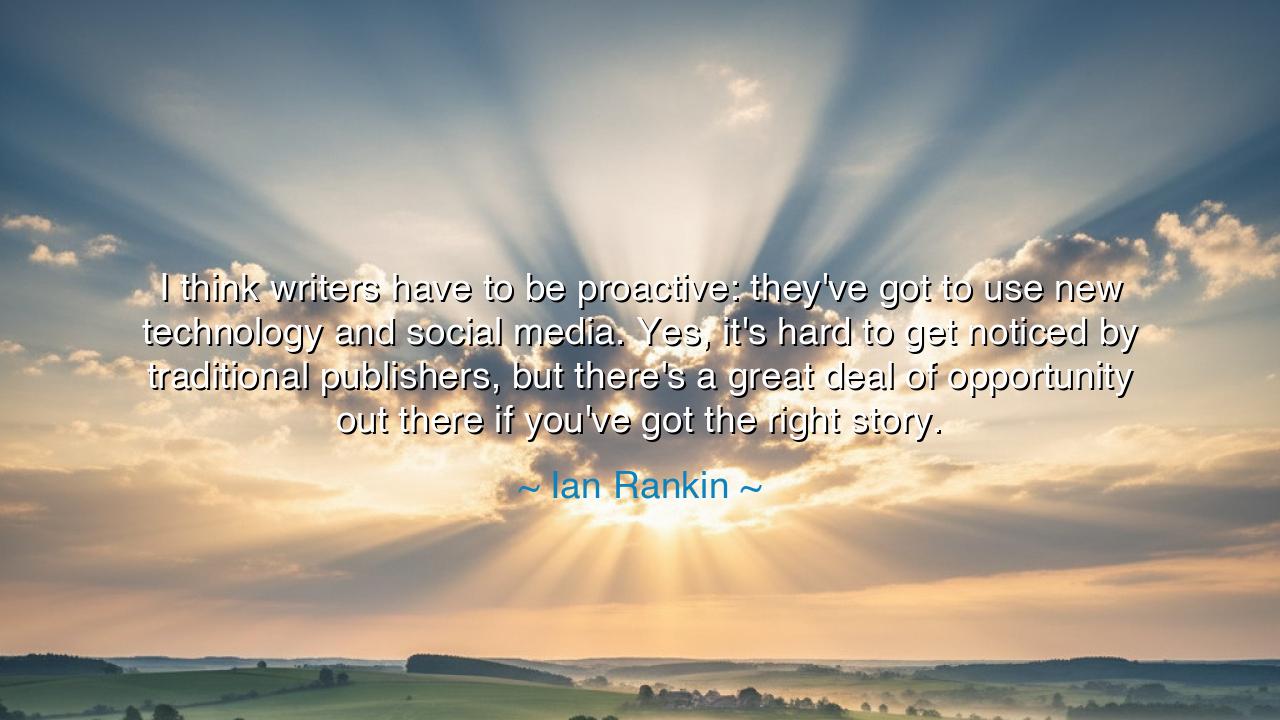
I think writers have to be proactive: they've got to use new
I think writers have to be proactive: they've got to use new technology and social media. Yes, it's hard to get noticed by traditional publishers, but there's a great deal of opportunity out there if you've got the right story.






Ian Rankin once declared: “I think writers have to be proactive: they've got to use new technology and social media. Yes, it's hard to get noticed by traditional publishers, but there's a great deal of opportunity out there if you've got the right story.” These words are both a challenge and an encouragement. They remind us that in this age, the writer’s craft cannot be cloistered in solitude alone. To succeed, one must embrace the tools of the age—technology, social media, and every channel by which words may find readers. The path to recognition may no longer rest solely upon the gates of traditional publishers, but in the courage of the author to step forth and share their vision with the world.
The origin of these words is rooted in Rankin’s own experience as a writer. Known for his Inspector Rebus novels, he saw firsthand how difficult it was for new voices to break through in the publishing industry, where gatekeepers decide what is worthy. Yet with the rise of digital publishing and online platforms, he recognized a transformation. No longer are storytellers bound only to ink and paper; they may now share their works through screens and streams, reaching across nations in moments. His insight reflects the wisdom of one who has lived within the old order and witnessed the dawn of the new.
History too affirms this truth. Consider the printing press of Gutenberg, a revolution of its time. Before its invention, books were hand-copied by scribes, rare and precious. With the press, knowledge leapt beyond monasteries and noble halls into the hands of common people. Writers who embraced this new technology became immortalized; those who feared it were left in silence. So it is now with the Internet and social media: the modern press, the vast scroll of the digital age. The opportunity is immense, but it requires the proactive spirit to wield it.
Rankin’s wisdom is not simply about tools, but about the courage to act. Many writers wait endlessly for recognition, hoping a publisher’s eye will chance upon them. But the truth is harsher: without action, stories remain unheard. The writer must go forth, not only crafting words in solitude but also sharing them with the world, seeking readers wherever they dwell. For the story alone is not enough; it must be carried to its people, as the seed must be scattered upon fertile ground.
And yet, Rankin reminds us of a deeper truth: the heart of success still lies in the right story. Technology may carry words across the earth, but only truth, beauty, and authenticity will cause them to take root. Just as in ancient times when poets sang epics around the fire, it was never the loudest voice that endured, but the story that touched the soul. Thus, the tools are vital, but the soul of the work is greater still.
We see this lesson in the story of Andy Weir, the author of The Martian. Rejected by publishers, he posted his work chapter by chapter online. Through word of mouth, social media, and the passion of readers, his story spread like wildfire. Eventually, publishers who had once turned him away came to him. What changed? Not the story, for it was always good—but the method of reaching hearts had shifted. He was proactive, and through technology, his tale found its audience.
The lesson for us all is simple yet profound: be bold in sharing your gifts. Do not wait endlessly for permission, nor fear the judgment of gatekeepers. Use every channel—digital or traditional—to speak your truth. But let your focus remain on the authentic story, for without it, no technology can save you. Let patience guide you, but let proactivity drive you, for the world is vast and waiting for voices that dare to sing.
So remember this teaching: in this age, the writer is both creator and messenger. Proactivity, patience, technology, and story are the four pillars upon which your craft must rest. Seize them, and your words will travel beyond borders, beyond time, carrying your vision to the hearts of generations yet unborn.






AAdministratorAdministrator
Welcome, honored guests. Please leave a comment, we will respond soon